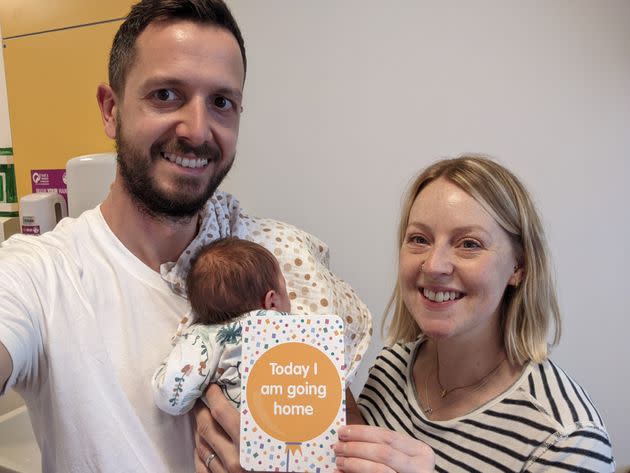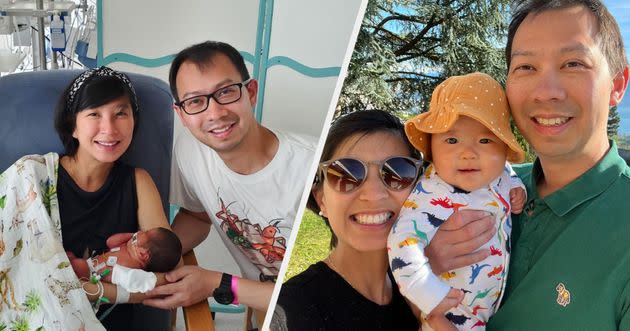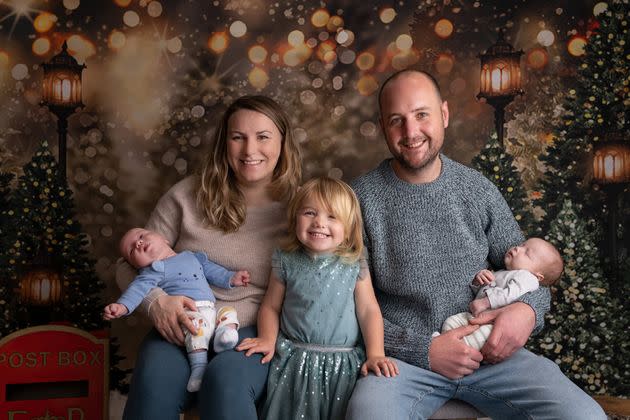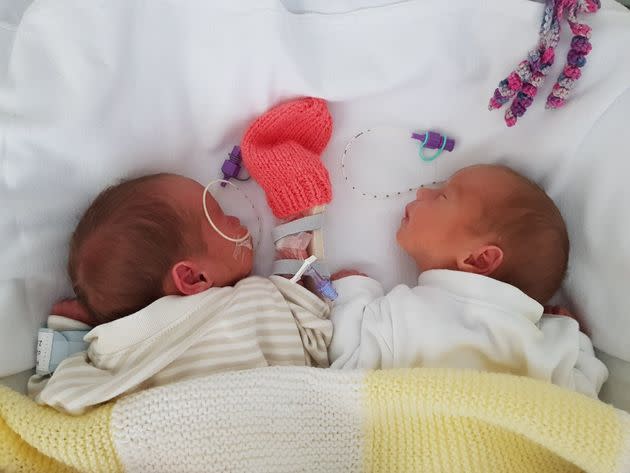Relief, Fear, Survivor’s Guilt: What It's Like To Bring Your Baby Home From NICU

Writer Charlie Bond with her husband Jamie and son Seb, who returned home after almost a month in NICU. (Photo: Charlie Bond)
Every new parent pictures what it’ll be like bringing their baby home for the first time, but for neonatal parents the experience is different. That’s because they have to wait days, weeks or sometimes months to reach that special moment.
When Nick Jonas and Priyanka Chopra shared on Instagram that their baby girl was finally home after more than 100 days, it brought back for me the complex emotions of returning home with my own baby from the neonatal intensive care unit – or NICU as it’s know for short.
In September 2021 I gave birth to my son six weeks prematurely, and for almost a month, my husband Jamie and I spent every day in the hospital, willing him to be able to come home with us. But, bringing him home wasn’t quite the newborn baby bubble I imagined it to be.
Survivor’s guilt
The day we brought Seb home after 24 days of neonatal care should have been one of the happiest of our lives, but instead I remember feeling an overwhelming sense of guilt. On paper, we had been among the “lucky” ones – steroid injections had meant Seb’s lungs developed fully and he was born able to breathe unassisted. Nor was he struggling to gain weight, a major reason premature babies are often kept in neonatal care.
Don’t get me wrong, our journey was far from easy, but when we were finally told we were being discharged, I felt guilty we were going home when there were other babies who still had weeks ahead of them in hospital.
Throughout Seb’s stay, I’d also felt guilty about leaving him in the hospital every day and returning home to what felt like my “old” life. While most new parents experience sleepless nights with a newborn, I was still getting a full night’s kip, eating with both hands and watching Netflix without interruption. I’d become a mum, but I felt like a fraud, because I didn’t have a baby at home to show for it.
Dianne and Min Wei from Tunbridge Wells in Kent spent 39 days in NICU when their daughter Maiya was born at 32 weeks, and Dianne also struggled with being at home without her baby.
“Coming home without Maiya was very strange,” she says. “Our lives were on hold because we only felt like we were parents to her when we were with her in the hospital. When we came home we felt guilty and almost like we were ‘cheating’ for getting a full night’s sleep. However, those first few weeks did give us time to recuperate and get everything ready before Maiya came home.”

Dianne and Min Wei and their daughter, Maiya, in hospital and after discharge. (Photo: Dianne Wei)
Post-NICU anxiety
Then, in those first few weeks with Seb at home (and this is probably going to sound strange), I missed the hospital. We’d got so used to having someone caring for our baby 24/7, and suddenly that was gone.
The reliance on the NICU monitors and alarms was also a hard habit to shake – in hospital, at the slightest dip in heart rate or oxygen, an alarm would sound and a nurse would be right there. Now, we had none of that comfort, and I became very anxious.
Dianne experienced similar. “We felt a big relief that we could finally be all together in the comfort of our own home, but also anxious as Maiya was now in our care and we no longer had the support we had in NICU,” she says. “While we were glad we didn’t have to visit the hospital any more, we were anxious about Maiya’s weight gain as this was a big challenge for her.”
For Libby Monks, 36, from Salisbury, bringing her baby Rosalie home from NICU after nine days was a hugely emotional, yet anxiety-inducing time, because her nephew Teddy had passed away in a neonatal unit at just three days old.
“Because of what happened to Teddy, I was terrified of NICU or anything being wrong with my baby,” she says.
“We had a false start when we were due to be discharged, and we were told we’d have to stay another night. I remember sobbing and saying, ‘I just want to go home, we have to make it home with her.’ My original birth plan included my mum coming down to support us after the birth and for her to stay up all night making sure Rosalie didn’t stop breathing like Teddy did, so there was a lot of trauma there.”

Libby Monks with her family. (Photo: Libby Monks)
Missed moments
Once we got home with Seb, it dawned on me how many moments we’d missed during those early weeks, and I’d feel jealous when other friends brought their newborns home almost immediately and shared photos of them. Because of the premature birth, I’d missed out on having a baby shower, didn’t even really get to the “nesting” stage of pregnancy (we were mid house renovations when he arrived), and we didn’t do things like change his first nappy, which I felt oddly sad about.
Libby also felt like she’d missed out on milestones due to Rosalie’s hospital stay, so when they were discharged, she wanted to make sure nobody else she’d met there felt the same.
“So many of Rosalie’s firsts were in NICU and whilst I was there, I couldn’t take a cute photo and post it on Facebook. I ended up buying around 25 sets of milestone cards as a thank you to the NICU unit and so that other parents didn’t have to miss out in the future.”
The NICU experience is an intense one that many parents it find easier to talk about with others who’ve been through the same thing. I found some friends and family didn’t really “get” how traumatic the experience had been. Other NICU parents just understood.
That said, sometimes talking about milestones with other neonatal parents could become competitive, especially with premature babies who have an ‘actual’ age and a ‘corrected’ one, based on their original due date. Despite reminding myself that all babies, premature or not, develop at different rates, I found myself comparing Seb to the other NICU babies, worrying whether he was on track, and then experiencing that survivor’s guilt again when he gained weight quicker, or slept better than others.
Silver linings
While I wouldn’t wish the neonatal experience on any parent, I did take a lot of positives from our time in their care. Of course it was horrible coming back without a baby night after night, but by the time Seb was home, my body had started to recover from labour and things like carrying him were a lot easier than they might have been had we brought him home the day after he was born.
We were also shown how to change his nappies, bathe him and dress him in the hospital – all things we would have had to navigate on our own if circumstances had been different.
For Libby, her first positive experience of NICU meant that she was mentally prepared when three years later she gave birth to twin boys at 32 weeks, and they spent four weeks in neonatal care.

Libby Monks' twin boys. (Photo: Libby Monks)
“A lot of the worry was taken away from a second NICU stay because we had been there before and knew the care was exceptional,” she says. “With my boys I had the insight to use NICU almost as a transition zone. I got to bond with and feed them, but didn’t have the responsibility of being their primary carers as the fantastic NICU staff did that.”
On Instagram, Nick Jonas referred to their family’s journey as a “rollercoaster” and he’s not wrong – but whenever that NICU baby finally comes home, the ride really begins… as does the sleep deprivation and the overflowing washing pile.
This article originally appeared on HuffPost UK and has been updated.

 Yahoo News
Yahoo News 